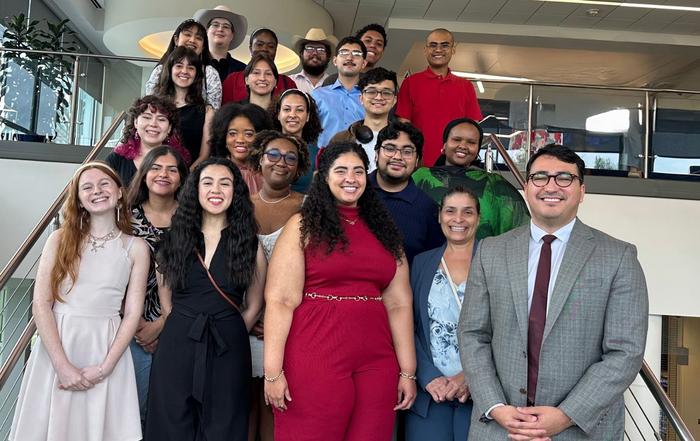In a significant stride toward fostering the next generation of scientific leaders, the University of Texas at Arlington (UTA) has proudly announced the selection of twenty-three exceptional students for the prestigious McNair Scholars Program. This program, funded by the U.S. Department of Education, is nationally recognized for its rigorous support in preparing undergraduate students for research-intensive academic careers, particularly at the graduate and doctoral levels. The McNair Scholars Program is designed not only to cultivate research acumen but also to fortify analytical, communication, and writing skills essential for scholarly success.
The program embodies a comprehensive approach to undergraduate research mentorship, enabling students to collaborate with internationally acclaimed faculty and researchers. Such immersive experiences afford scholars firsthand insight into the scientific method, experimental design, and data interpretation, which are critical components of hypothesis-driven research. Through this symbiotic researcher-mentee relationship, scholars gain an elevated understanding of how scientific inquiry drives innovation across disciplines such as physics, microbiology, public health, and engineering.
Central to the McNair experience is a federally mandated summer internship, during which students receive stipends to engage deeply with complex, real-world scientific challenges. These opportunities take place within university laboratories, where scholars apply advanced methodologies and technologies to pressing issues. Examples include investigations into cardiovascular disease pathogenesis, material science developments for aerospace applications, and ecological studies addressing environmental sustainability. By engaging directly with such forefront problems, students refine their technical skills and appreciate the broader societal impacts of scientific advancements.
Eligibility criteria for this highly competitive program are stringent, reflecting its aim to nurture students with a strong academic record and clear intent to pursue doctoral studies. Participants must maintain a minimum 3.0 GPA, be U.S. citizens or permanent residents, and demonstrate a passionate commitment to scholarly research careers. This selective admission ensures that resources focus on promising individuals who will contribute to the diversification and enrichment of the scientific community at large.
Dr. Kayunta Johnson-Winters, UTA’s director of undergraduate research and an associate professor of chemistry and biochemistry, has remarked on the program’s transformational potential. She emphasizes that the McNair Scholars Program allows students to witness directly how scientific knowledge is generated and disseminated, while also fostering professional development avenues such as conference presentations and publication opportunities. This mentorship model supports scholars in navigating the complexities of graduate school applications and academic networking.
Beyond academics, the program promotes a robust community ethos among participants. Peer cohesion and faculty mentorship unite scholars, offering a support system that encourages perseverance in the face of intellectual and personal challenges common to rigorous research careers. Dr. Ricardo Garza, UTA’s McNair Scholars Program director, highlights the intentional cultivation of confidence and academic identity as critical outcomes of this community-building.
Named after Dr. Ronald E. McNair, an eminent physicist and astronaut tragically lost in the Challenger disaster, the program honors his legacy of perseverance and excellence in STEM fields. Dr. McNair’s brother, Carl McNair, the program’s founder, recently visited UTA to inspire the current cohort with stories of resilience and the imperative to “not self-select out” of opportunities. This motivational ethos aligns with long-term goals of expanding access to advanced education and increasing representation of historically marginalized groups in high-level research domains.
The interdisciplinary composition of the UTA scholars is notable, encompassing majors spanning political science, physics, microbiology, mathematics, public health, and engineering. This breadth reflects the program’s commitment to cultivating a diverse portfolio of scholars equipped to address multifaceted scientific and societal problems. Students hail from varied geographic and cultural backgrounds, including international students from Nigeria, Djibouti, and Brazil, adding rich perspectives to the program’s collaborative environment.
In fostering scientific capacity, the McNair Scholars Program operates under the federal TRIO initiative, which has a proven track record of supporting nearly one million students nationwide. Such nationwide scale amplifies the program’s impact, contributing significantly to the academic pipeline that feeds into research universities and professional disciplines. UTA’s iteration of this program aligns with its Carnegie R-1 classification, reflecting a research-intensive agenda second to none in Texas and placing it among the nation’s top 5% of research institutions.
The program’s impact is further magnified by UTA’s strategic location within the Dallas-Fort Worth metroplex, a burgeoning hub for technology and innovation. This geographical advantage enables scholars to leverage resources and partnerships across academia, industry, and government. It also positions graduates for impactful careers that may influence regional and national scientific and technological landscapes.
UTA’s commitment to undergraduate research is exemplified in complementary institutional initiatives prioritizing student engagement in scholarly activity. These efforts include dedicated mentoring, funding for conference travel, and structured support for successful graduate school entry. The McNair Scholars Program functions synergistically within this ecosystem, enhancing educational attainment and strengthening the university’s broader mission of economic and social progress.
As the program enters its new academic cycle, the hopeful outlook focuses on equipping scholars with both the technical expertise and critical thinking frameworks necessary for pioneering research. By embedding students deeply within the scientific enterprise early in their academic journeys, the program aspires to produce thought leaders ready to tackle complex challenges in fields ranging from biochemistry and neuroscience to engineering and public policy.
Ultimately, the UTA McNair Scholars Program represents a beacon of opportunity for undergraduate students aspiring toward research careers, combining rigorous preparation, mentorship, and community support. It stands as a testament to the university’s vision of fostering diverse scientific talent that will drive innovation and expand the frontiers of human knowledge in the coming decades.
Subject of Research:
Undergraduate research preparation and mentorship through the McNair Scholars Program.
Article Title:
University of Texas at Arlington Selects 23 Students for Prestigious McNair Scholars Program to Advance Research Careers
News Publication Date:
2025
Web References:
- https://www.uta.edu/research/opportunities/undergraduate-research/programs/mcnair
- https://www.uta.edu/enrollment-management/trio/educational-talent-search/what-is-trio
- https://www.uta.edu/news/news-releases/2024/06/25/ut-arlington-prioritizes-undergraduate-research-to-ensure-student-success
- https://www.uta.edu/news/news-releases/2025/01/28/uta-research-drives-innovation-and-impact
- https://www.uta.edu/news/news-releases/2024/12/02/uta-student-recognized-for-research-on-high-fat-diets
- https://www.uta.edu/news/news-releases/2025/02/26/program-expansion-boosts-student-research-opportunities
- https://www.uta.edu/news/news-releases/2023/10/20/founder-of-mcnair-scholars-inspires-uta-student-researchers
Image Credits:
University of Texas at Arlington (UTA)
Keywords:
Undergraduate students, McNair Scholars Program, research universities, scientific careers, STEM education, academic mentorship, graduate preparation, research internships, diversity in science, scientific method, higher education, federal TRIO program.




